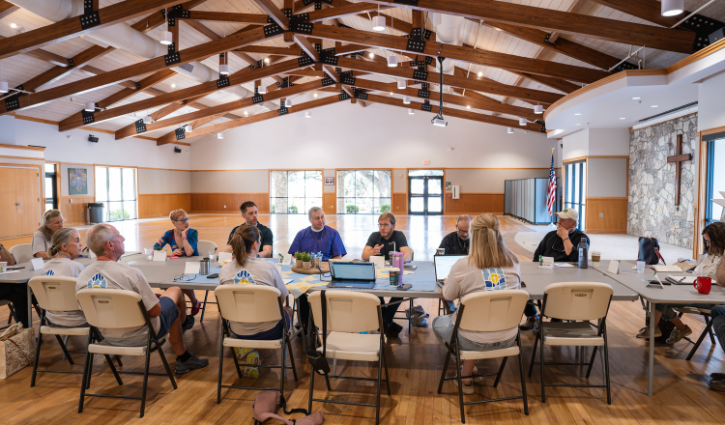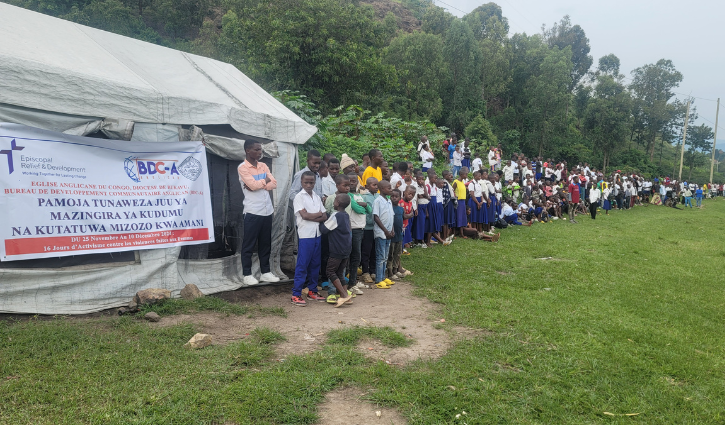Bridging the Gap: Why Mental Health Care Should be Part of Long-Term Disaster Recovery

For World Mental Health Day, the World Federation of Mental Health is recognizing the importance of accessing mental health services, specifically during catastrophes and emergencies.
At Episcopal Relief & Development, one of our four interconnected priority areas is Disaster Response. Rooted in the Episcopal tradition, our disaster response work is made possible through partnerships with local faith-based and other community-led organizations and an extensive network of faith leaders, volunteers and staff dedicated to supporting people and communities impacted by natural disasters and human-made crises.
In disaster relief and recovery spaces, mental health care is not always prioritized as much as other forms of assistance like monetary aid, food and water distribution, housing and other aspects of support.
“Concern for things like lack of shelter can drown out concerns about mental health,” explained Katie Mears, Episcopal Relief & Development’s Sr. Technical Specialist, US Disaster & Climate. “But as time goes on, your ability to proactively work on getting sheltered becomes harder the worse your mental health gets. Disasters turn up the volume of whatever is happening–if you were a little bit depressed before a disaster, that gets amplified.”
While trauma and other mental health-related issues may not always be easily identifiable immediately following a catastrophic event, mental health and well-being need to be addressed as part of full, long-term healing and recovery.

“When a disaster hits, people can experience intense unexpected stress,” said Race Hodges, Episcopal Relief & Development’s Program Officer for the Global Disaster Response team. “If people aren’t already plugged into a strong support network, if they don’t already have someone to talk to when they are dealing with things like displacement, job loss or uncertainty about insurance payouts, that can lead to deep mental health impacts that folks can’t climb out of.”
In early July 2025, we partnered with the Episcopal Diocese of West Texas in response to the Texas Hill Country flooding crisis. We worked with partners to provide financial resources and emotional and spiritual support to those in the Kerrville, Texas area. Emotional and mental health care were part of this response effort.
In many of the communities we serve, people feel most comfortable talking to their priest or other spiritual leader and may prefer that before seeing a counselor or other mental health professional. Clergy from our church partner organizations are trusted by members of the community. Moreover, they have been trained in pastoral care as part of their seminary education.
Pastoral care doesn’t only happen in a church. Often, our partners coordinate community social events, sometimes with catered food, music and other kinds of entertainment. In this low-pressure, informal environment members of the clergy and local mental health professionals make themselves available to individuals and families who want to talk, ask questions, pray, vent or just sit.

“Internationally, the Covid crisis highlighted and re-prioritized the importance of providing mental health services,” explained Nagulan Nesiah, Episcopal Relief & Development’s Senior Program Officer for Disaster Response. “Pastoral care is something that our church partners around the world naturally do well. Pastoral care is part of Episcopal Relief & Development’s ‘secret sauce’ as a disaster response organization. But, it should always be coupled with a referral system for professional services.”
When Episcopal Relief & Development’s partners discern that someone is in need of more than pastoral care, when they encounter an issue they can connect them with local professional mental health services.
“Pastoral care is not all encompassing,” said Katie Mears. “Sometimes, talking informally with a priest or deacon can be enough, whereas other times it’s not. It’s got to be pastoral care plus thoughtful referral. It’s critical that faith leaders are able to discern when it’s time to refer someone to professional care. We support our partners to do that.”
With disasters on the rise, and even more communities reliant on services and support, providing access to intentional trauma and mental health care services–for survivors and responders–helps them navigate the emotional life-cycle of a disaster and reach full, sustained recovery.
It’s a complex, ongoing journey. One that can be walked–together.
If you or anyone else you know is struggling and impacted by mental health, we’ve compiled a list of free resources and prayer guides below:
- Episcopal Relief & Development’s Prayers for Mental Health & Mindfulness
- Episcopal Relief & Development’s Blog ‘Self Care Suggestions for Those Whose Work Involves Trauma’
- NAMI (National Alliance of Mental Illness)
- World Health Organization
- Substance Abuse and Mental Health Services Administration (SAMHSA)
- Mental Health America (MHA)
- The Trevor Project
- American Foundation for Suicide Prevention (AFSP)


